This year marks 35 years of the Seidenberg School of Computer Science and Information Systems being an independent school at Pace University. Originally called the School of Computer Science and Information Systems, the school gained the Seidenberg name in 2005, when Ivan Seidenberg made a record-breaking donation to Pace University in support of his strong belief that all students should receive a tech education.
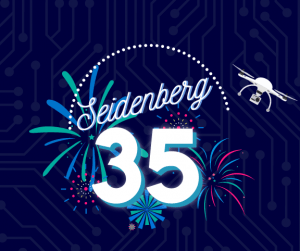
It’s only natural that, now, whenever Mr. Seidenberg stops by his namesake school, there’s a hint of celebrity in the air. As a top executive for much of his career, Ivan already cuts an impressive figure. However, his 2005 gift to Pace University has been hugely significant for many of our students, enabling them to attend the Seidenberg School as part of the Seidenberg Scholars program – so there is also a sense of gratitude among the excited whispers that there’s a famous celeb at Pace.
So it was no surprise that on Thursday, November 8, 2018, the Seidenberg Lounge at 163 William Street was packed. Students, faculty, and staff turned up in force to meet and hear Ivan speak about his fascinating career, his leadership, and his advice for the next generation of technology executives.
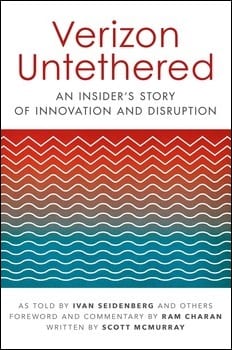
Not only was Mr. Seidenberg on campus to share his wisdom with the community, but we had a crate of volumes of his new book, Verizon Untethered: An Insider’s Story of Innovation and Disruption ready to be signed and shared with our students.
Our guest sat down with Jonathan Hill, Dean of the Seidenberg School, for a fascinating conversation before an audience that was bursting at the seams. After the introductions, the pair cut swiftly to the chase with Dean Hill’s first question – what can our students do to succeed in the workplace?
Ivan’s response was refreshingly honest. “When you go out in this world and you’re high maintenance, people will get rid of you,” Mr. Seidenberg said. “If you’re not a good teammate – you’re gone. Be a good teammate, be collaborative, be nice to work with . . . together you can do great things.”
One point our visiting tech leaders often make is the importance of working well with others, and here was Ivan Seidenberg himself iterating the same idea. He continued with a caution about letting one’s ambitions get in the way of relationships: “Even if you have great ambition, your ambition should not dominate those around you,” he said. “Realize that people are watching you all the time.”
He summed everything up with a list of his top three tips:
- Know your stuff
- Don’t be a pain (you are always being watched)
- Don’t be afraid to take risks
“It’s okay to win, and it’s okay to fail,” he added, noting that he had always found that the harder the work was, the more engaged he got and the more engaged the people around him became.

On leadership
“There’s a transition that folks do early in their career where they’re called upon to lead,” said Dean Hill. “In the book, you make the statement that leadership has less to do with the individual and more to do with the cultural norms . . . what should people do to cultivate leadership?”
Ivan replied: “I have one word that starts the whole process – accountability. When you’re personally accountable, you accept the responsibility of whatever you’re doing. It shows up in your language . . . accountability starts with your personal willingness to take control of the things you can control.”
He continued, listing two other crucial aspects of leadership: “Leadership is all about standards . . . those people who watch you . . . they watch how you do your work. Do you cut corners?” This was followed by the third facet, respect. “Leadership is also about respect – how you treat other people. Do you treat others as equal?”
And even when you’re in a position of power, what you think is right and correct doesn’t always mean it’s right and correct. To earn respect and trust, a good leader performs the job according to the needs of the people around them, rather than their own ideas. “It wasn’t what I thought was a good job, it was what the people around me thought was a good job.”
Leading by serving the needs of others may sound counter-intuitive, but it’s an effective technique.
Dealing with crises
“How do you deal with crises?” was Dean Hill’s next question.
“Never think it’s about you,” Ivan said. “You don’t face any challenges solo. Particularly in business, it’s got to be about partners. If you embrace that, you have the power of four eyes instead of two, four ears instead of two, two brains . . . and especially for you [students], you understand the power of scale.”
One of the keys in dealing with crises is coming at it head on: “It’s never a case of backing away from it, it’s about embracing it.”
MENTORSHIP
Dean Hill brought up the next topic: mentorship. “In the book, you mention a lot of people who mentored you . . . how did you forge these relationships?”
Ivan responded with a story. He explained about how, when he retired in 2011, lots of people told him he should write a book. After thinking about it and deciding he’d like to give it a try, he spent a lot of time talking to people who influenced his life and his career, and listening to their stories. Those stories became the chapters of his book. “It’s an example of how the power of more than one creates a story,” he remarked.
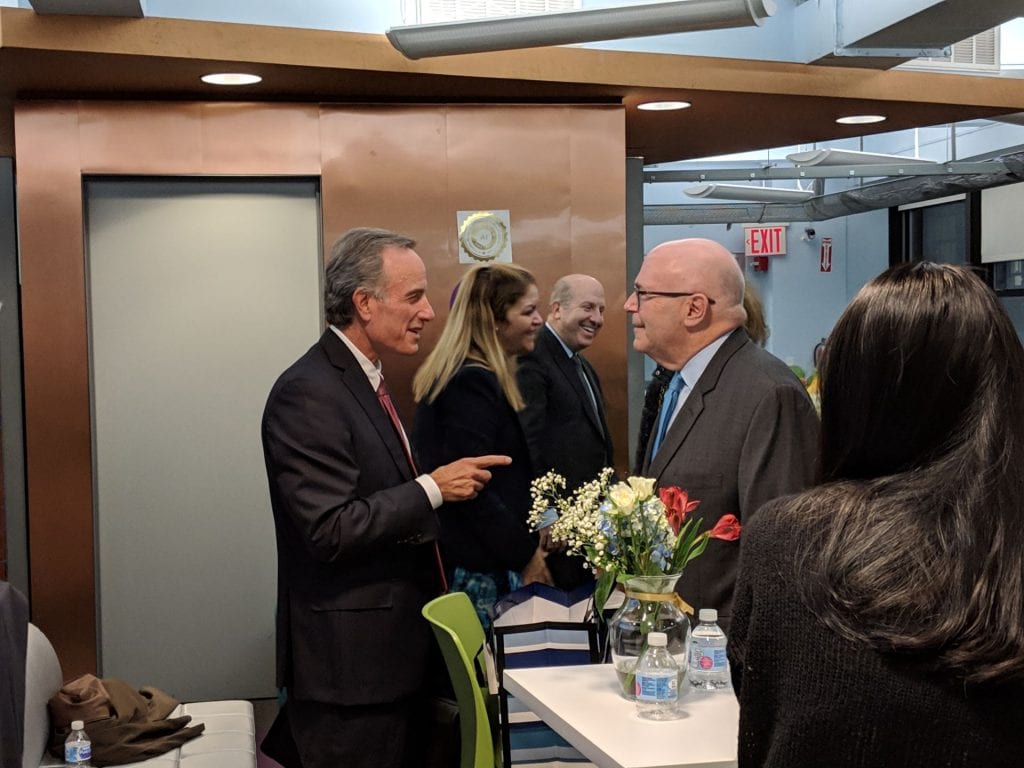
He was then asked to define what a ‘win’ meant for him. “A win wasn’t necessarily more money, it was having a higher purpose,” he said, and continued with an example from his time at Verizon. Verizon wanted to provide unlimited bandwidth to its customers but was constrained by the capabilities at the time. The company still wanted to do something good for its customers, so they shifted perspective and came up with the goal of becoming the ‘best network’. Once they agreed on their higher purpose, they were able to start acting to make it happen.
#SEIDENBERGPRIDE
It was a good time for Dean Hill’s next question: what are you most proud of?
“Beside my family?” Ivan quipped, smiling at his wife in the front row. “I think in business it’s very simple. When I retired, that was the first question I was asked. The most important contribution to me is that I look back at the company now and see that Verizon is stronger, more independent and more in control of its future. And that’s all I could ever ask for.”
Mr. Seidenberg went on to explain his belief that Verizon is in the position it’s in today because of the people. When he was CEO there, he made sure to manage and mentor the people who would maintain the quality of work that he believed in, even if they employ different styles. “That is the most important thing: to produce people who can achieve things their way.”
He also shared an anecdote offering an interesting perspective on 9/11. One of the less talked-about consequences of the events on that day included a huge hit to cellular service, which affected not only the stock market but individuals and emergency services who were desperately trying to get in touch with one another. Ivan, alongside his team at Verizon, set to reconnecting the country, working diligently to fix the service problems that were preventing people from finding out if their loved ones were okay and services like the fire service from communicating. “9/11 was one of our greatest services,” he told students, “not just for getting the stock market back up and running, but for getting the country back up and running.”
Looking to the future: it’s all about that 5G
“We’re entering the fourth industrial revolution,” said Dean Hill. “What excites you in technology right now?”
“In our industry, all roads lead to 5G. When you think of 5G from where you sit, it’s very cool – latency (the speed of the network) will soon be 50 times what it is today. 5G, coupled with sharper engineering, systems integration, and with IT capability across institutions, will completely change everything. Whatever component of this industry you’re interested in . . . connectivity, network, software systems, and applications – there’s no component holding back all the others. In the next 40 years, what will happen with all of this technology is that it’ll probably get even faster . . . the ability to make the world smaller and provide utility and good, it’s incomprehensible the kind of things that can be done.”
He added: “And I love where you are, you’re getting the kind of education that’ll put you right there.”
On that note, Dr. Hill asked: “what advice do you have for our students to maximize the opportunity of being in school now?”
“If I were the HR department and I was hiring people, I’d assume you’ll have a degree like everybody else. It’ll be a good degree coming out of Pace, but I’d want to know a few other things . . . I’d like the idea that you’ll have done a few collaboration projects for other people . . . I’d like to know that you fixed some programs for other people – having activity that isn’t part of your program.”
Having extracurricular work on one’s resume, especially that demonstrates hands-on experience, is never a bad thing. “Coming in with a resume of activity that fits what you do – it doesn’t have to be scientific, it can be that you like to work with others, you like to work with the scientific community . . . we love good grades, obviously, but we also like to know that you’re worthy of taking a risk on; someone’s got to invest in you.”
Finally, one should never underestimate the power of a smile, according to Ivan Seidenberg! “I love when you walk in the door and you smile . . . smiling is good, it can disarm people.”

Over to you
As time was trickling away too quickly, the Dean turned to the audience for questions. Here are a few of them with Ivan’s responses.
Q: What do you do now that you’re retired?
A: Lots! I participate on boards, invest in companies – including startups. I like investing in helping people to succeed
Q: If you were a college graduate today, would you pursue the same career or something different?
A: I’m only going tell you this cos you shouldn’t do what I did . . . I ended up leaving day school and going to night school. I ended up in the army because of that. I ended up overseas, somewhere I didn’t want to be, because I dropped out of day school. Then I ended up working at the phone company because I dropped out of day school . . . obviously it worked out! But I realized that over that time that I had to fit in, that I couldn’t be an outcast. I had to realize that the sun and the moon and the starts didn’t revolve around me. Sound familiar? What I would not change is the lessons I learned and how I applied them. But whether they would lead me down the same career could be different.
Q: What big risks did you take?
A: I came home and told my wife “we’re moving to Washington!” . . . that was the hardest sale I’ve ever had to make! The other one was when I chose to give up my job as CEO and become co-CEO. Most of the risks you take are personal. They’re not business risks.

Following the Q&A session, the event moved to the renovated collaboration space where a table had been set up for the book signing. Students lined all the way down the hallway for their chance to meet and shake hands with the Seidenberg School’s benefactor. A small celebration took place as the Seidenberg community thanked Mr. Seidenberg for the visit and for his honesty and depth during the discussion. Pace University President Marvin Krislov and Provost Vanya Quiñones also stopped by to greet our guest, and we were happy to see quite a few alumni return to their old stomping grounds for the occasion.
Ivan Seidenberg’s book, Verizon Untethered: An Insider’s Story of Innovation and Disruption, is well worth the read for any aspiring leader who wants to learn from one of the best.
We’d like to thank Mr. Seidenberg and his wife Phyllis for their time and generosity throughout this event. Students gave the most positive reviews and we hope to have you back in 2019!
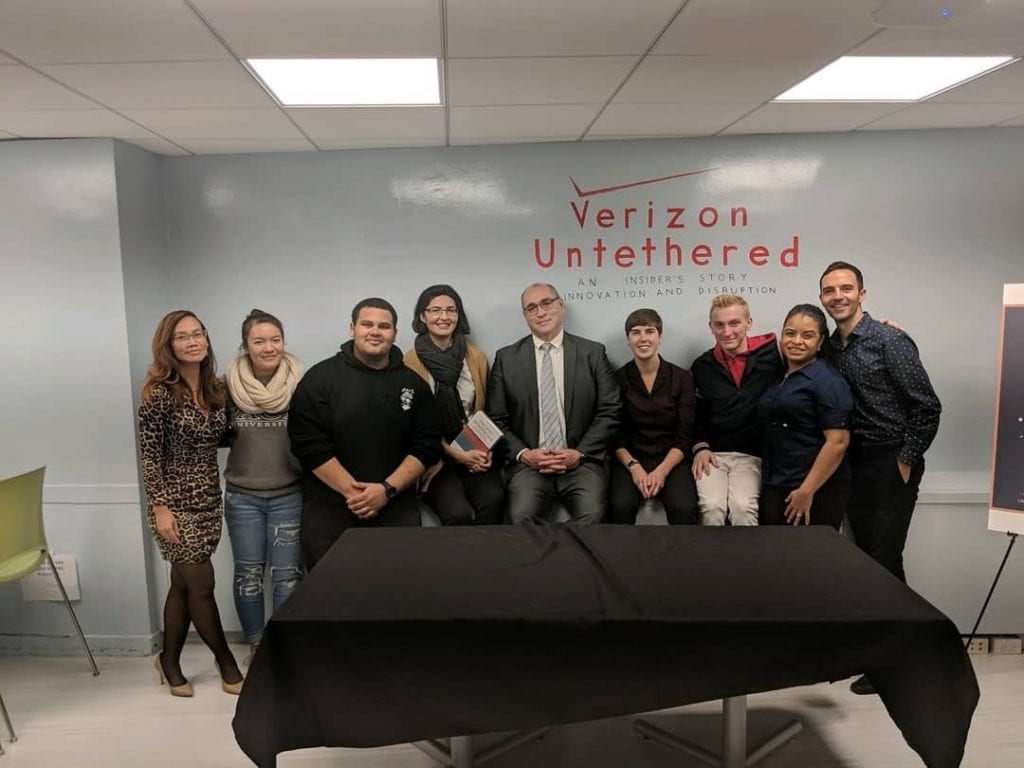


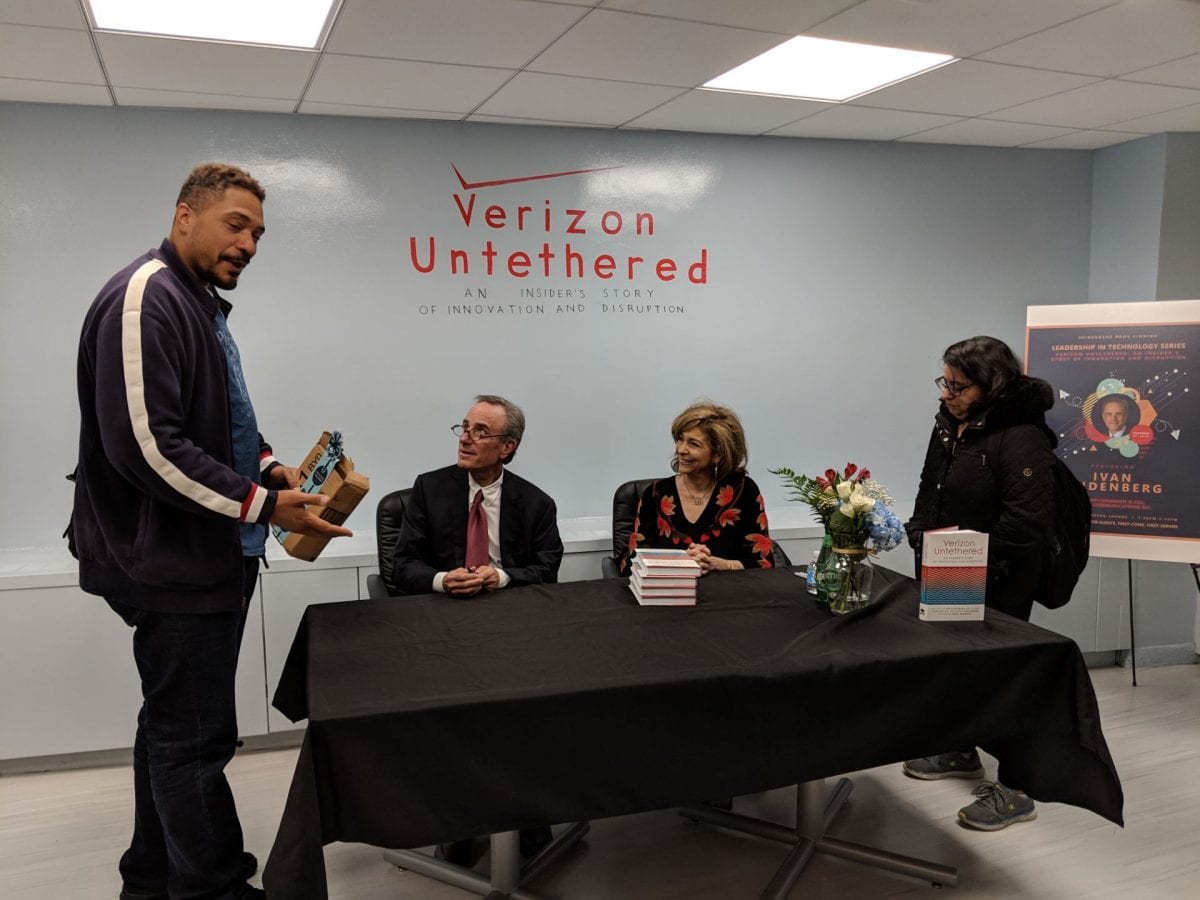
This book by Seidenberg is also available on Audible. It is easy to listen to on the commute.
That’s right! Verizon Untethered: An Insider’s Story of Innovation and Disruption is available to read in both physical and digital editions, as well as in audio format. So however you prefer to ‘read’ books, there’s an option for you 🙂